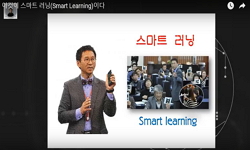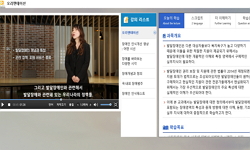This study examined the effects of a language training application program, which was developed to improve Intellectual Developmental Disorder students` RAN, using two representative user-friendly technologies of smart devices: voice recognition techn...
http://chineseinput.net/에서 pinyin(병음)방식으로 중국어를 변환할 수 있습니다.
변환된 중국어를 복사하여 사용하시면 됩니다.
- 中文 을 입력하시려면 zhongwen을 입력하시고 space를누르시면됩니다.
- 北京 을 입력하시려면 beijing을 입력하시고 space를 누르시면 됩니다.

스마트기기를 활용한 언어훈련 프로그램이 지적장애 학생의 RAN 능력에 미치는 효과 = Effects of a Smart Device Based Language Training Application Program on RAN Ability of Students with Intellectual Developmental Disorder
한글로보기https://www.riss.kr/link?id=A99807307
- 저자
- 발행기관
- 학술지명
- 권호사항
-
발행연도
2013
-
작성언어
-
- 주제어
-
KDC
300
-
등재정보
KCI등재
-
자료형태
학술저널
-
수록면
99-123(25쪽)
-
KCI 피인용횟수
13
- 제공처
-
0
상세조회 -
0
다운로드
부가정보
다국어 초록 (Multilingual Abstract)
This study examined the effects of a language training application program, which was developed to improve Intellectual Developmental Disorder students` RAN, using two representative user-friendly technologies of smart devices: voice recognition technology and text-to-speech technology. The language training application program, developed on the Android operating system, consists of 8 periods, each period including learning new vocabulary words and playing games with them. The application program contains a total of 40 words, and 5 words are taught each period. The validity of this application program was reviewed by 10 special elementary school teachers, in terms of its design, content appropriacy, and field applicability. The review group concluded that the application program was suitably designed and organized for students with mild Intellectual Developmental Disorder, and that it is therefore applicable to other schools. The 27 participants in this study were special elementary school students with mild Intellectual Developmental Disorder who were not able to read properly. The participants were divided into an experimental group (containing 14 students) and a control group (containing 13 students). The experimental group received language training through the language training application program, 4 days a week for 30 minutes each session. The control group received language training with picture-word cards, 4 days a week for 30 minutes each session. The language training program consists of 8 periods, and each period has 2 sessions. In total, 16 sessions were provided for 4 weeks. Analysis of the data in this study included comparison of the pre-and post-test results of the two groups test were a RAN. Results indicated that the experimental group showed significantly greater improvement than the control group in the areas of numbers and colors in RAN tests. Similarly, the experimental group also showed significantly greater improvement in the areas of words with meaning in word recognition tests. These results suggest that the language training application program was highly effective in improving Intellectual Developmental Disorder students` RAN.
참고문헌 (Reference)
1 김용욱, "효과적인 ICT 활용을 위한 교수 실행 방안" 한국특수교육문제연구소 4 (4): 259-279, 2003
2 김석종, "해양정보관리" 교육과학기술부 2011
3 곽금주, "한국웩슬러아동지능검사(K-WISC-Ⅲ)" 도서출판 특수교육 2001
4 이원령, "학습장애아동의 읽기 명명속도와 유창성 중재방법에 대한 고찰" 특수교육재활과학연구소 46 (46): 35-57, 2007
5 권정민, "태블릿(아이패드)과 종이 매체간의 지적장애 학생의 읽기 수행 비교" 한국지적장애교육학회 13 (13): 187-202, 2011
6 백선혜, "초등학교 저학년 국어교육용 어휘 선정 연구 : 의미 영역을 중심으로" 한국교원대학교 대학원 2004
7 김수미, "청소년의 정보통신윤리교육을 위한 웹 코스웨어 설계 : 역기능 사례중심" 전남대학교 교육대학원 2009
8 박승희, "정신지체 학생의 지역사회 기능에 필요한 기능적 어휘 목록 개발 연구" 3 (3): 23-57, 1999
9 김주영, "정신지체 특수학교 교사의 ICT 활용 실태와 활성화 방안" 대구대학교 교육대학원 2009
10 한성희, "재활공학장치 교수학습용 멀티미디어 교육매체" 공주대학교특수교육연구소 2002
1 김용욱, "효과적인 ICT 활용을 위한 교수 실행 방안" 한국특수교육문제연구소 4 (4): 259-279, 2003
2 김석종, "해양정보관리" 교육과학기술부 2011
3 곽금주, "한국웩슬러아동지능검사(K-WISC-Ⅲ)" 도서출판 특수교육 2001
4 이원령, "학습장애아동의 읽기 명명속도와 유창성 중재방법에 대한 고찰" 특수교육재활과학연구소 46 (46): 35-57, 2007
5 권정민, "태블릿(아이패드)과 종이 매체간의 지적장애 학생의 읽기 수행 비교" 한국지적장애교육학회 13 (13): 187-202, 2011
6 백선혜, "초등학교 저학년 국어교육용 어휘 선정 연구 : 의미 영역을 중심으로" 한국교원대학교 대학원 2004
7 김수미, "청소년의 정보통신윤리교육을 위한 웹 코스웨어 설계 : 역기능 사례중심" 전남대학교 교육대학원 2009
8 박승희, "정신지체 학생의 지역사회 기능에 필요한 기능적 어휘 목록 개발 연구" 3 (3): 23-57, 1999
9 김주영, "정신지체 특수학교 교사의 ICT 활용 실태와 활성화 방안" 대구대학교 교육대학원 2009
10 한성희, "재활공학장치 교수학습용 멀티미디어 교육매체" 공주대학교특수교육연구소 2002
11 최성규, "장애아동의 어휘지도를 위한 일반아동의 기초 어휘 난이도 분석" 6 : 53-72, 1999
12 김애화, "음운인식, 빠른 자동 이름대기, 자모지식, 단기기억, 작동기억과 한글 단어인지 능력 간의 관련성에 관한 연구: 읽기장애 조기선별을 위한 기초연구" 한국특수교육학회 45 (45): 247-267, 2010
13 권오탁, "시스템 분석과 설계론" 정일 1999
14 김경신, "빠른이름대기 훈련을 통한 지적장애아동의 명명속도와 읽기 유창성을 향상시키기 위한 사례연구" 한국지적장애교육학회 12 (12): 97-118, 2010
15 김길순, "빠른 명명하기 훈련이 학습장애아의 명명속도와 읽기 유창성에 미치는 효과" 한국학습장애학회 6 (6): 151-171, 2009
16 이태수, "반복읽기(RCR)와 SQ3R 독해전략이 읽기장애아동의 읽기유창성과 읽기이해에 미치는 효과" 한국특수교육학회 41 (41): 133-147, 2007
17 박승수, "멀티미디어의 특수교육적 효과" 21-27, 1995
18 한경임, "멀티미디어 학습 프로그램이 학습 장애 아동의 읽기와 쓰기에 미치는 효과" 한국정서·행동장애아교육학회 18 (18): 47-72, 2002
19 김영란, "멀티미디어 교육 자료 개발에 대한 반성과 과제" 7 : 279-304, 2002
20 김성수, "단순언어장애 아동의 기능적 작업기억과 낱말 습득 특성" 단국대학교 대학원 2004
21 박희향, "끊어읽기(CR)·반복읽기(RR)가 자폐성 아동의 읽기 유창성과 읽기 이해에 미치는 영향" 단국대학교 특수교육대학원 2008
22 김옥기, "경도 지체아동의 교육방법" 교육과학사 1990
23 이세흠, "u-러닝이 지적장애학생의 자기주도적 학습능력에 미치는 영향 : 스마트기기 활용을 중심으로" 창원대학교 2012
24 Nolan, P., "The microcomputer as learning system" 19 : 24-33, 1984
25 Hoskisson, K., "The many facets of assisted reading" 52 : 312-315, 1975
26 Dawson, L., "The effects of teacher versus computer reading models" 25 (25): 105-113, 2000
27 Van der Leji, A., "Remediation of reading-disabled children by presenting text simultaneously to eye and ear" 31 : 229-242, 1981
28 Denckla, M. B., "Rapid Automatized naming(RAN) : Dyslexia differentiates from other learning disabilities" 14 : 471-479, 1976
29 이진옥, "RAN, 음운인식, 그리고 읽기와의 관계 연구. 석사학위논문" 2002
30 Rice, M. L., "Preschooler's QUIL: Quick incidental learning of words, In Children's Language, 7" Lawrence Erlbaum Associates Inc 171-195, 1990
31 Ackerman, P. T., "Phonological process, confrontational naming, and immediate memory in dyslexia" 26 : 597-609, 1993
32 Felton, R. H., "Phonological process as predictors specific reading skills in children at risk for reading failure" 2 : 39-59, 1990
33 최정미, "PREP의 교량적과제 수정이 읽기장애 위험 유아의 읽기 기능에 미치는 효과" 한국특수교육문제연구소 8 (8): 389-407, 2007
34 Pierangelo, R., "Learning disabilities. A partical approach to foundations, assessment, diagnosis, and teaching" Pearson Education, Inc 2006
35 고진복, "KIDS VOICE를 활용한 AAC 중재가 뇌성마비아동의 어휘표현에 미치는 효과" 공주대학교 특수교육대학원 2005
36 Newby, T., "Instructional technology for teaching and learning" Prentice-Hall Inc 2000
37 Bryant, D. P., "Instructional strategies for content-area reading instruction" 3 (3): 293-302, 1999
38 최성규, "ICT의 수준별 적용이 학습장애아동의 읽기와 쓰기에 미치는 효과" 한국정서·행동장애아교육학회 19 (19): 425-448, 2003
39 Davies, D. M., "Enhancing independent task performance for individuals with mental retardation through use of a handheld self-directed visual and audio prompting system" 37 : 209-218, 2002
40 Bowers, P, G., "Effects of naming speed differences on fluency of reading after practice" 682 : 318-320, 1993
41 Dever, R, B., "Defining Mental Retardation From an Instructional Perspective" 28 (28): 147-153, 1990
42 이지혜, "Dale-Chall의 이독성 공식을 이용한 한국어 읽기 텍스트 분석 연구" 경희대학교 교육대학원 2009
43 Lally, M., "Computer-assisted teaching of sight-word recognition for mentally retarded school children" 85 (85): 383-388, 1981
44 Badian, N. A., "A variation of the role of preschool phonological and orthographic skills in the prediction of reading" 31 : 472-482, 1998
동일학술지(권/호) 다른 논문
-
지적장애 특수학교의 자기결정 교수환경에 대한 교사의 인식
- 한국지적장애교육학회
- 정성민 ( Sung Min Jung )
- 2013
- KCI등재
-
- 한국지적장애교육학회
- 김우리 ( Woo Ri Kim )
- 2013
- KCI등재
-
지적장애인을 위한 지원정도척도의 신뢰도 및 문항변별도 분석
- 한국지적장애교육학회
- 이옥인 ( Ok In Lee )
- 2013
- KCI등재
-
지적 및 발달장애학생의 가정생활기술에 대한 국내 실험연구 고찰
- 한국지적장애교육학회
- 김진호 ( Jin Ho Kim )
- 2013
- KCI등재
분석정보
인용정보 인용지수 설명보기
학술지 이력
| 연월일 | 이력구분 | 이력상세 | 등재구분 |
|---|---|---|---|
| 2022 | 평가예정 | 재인증평가 신청대상 (재인증) | |
| 2019-01-01 | 평가 | 등재학술지 유지 (계속평가) |  |
| 2016-01-01 | 평가 | 등재학술지 선정 (계속평가) |  |
| 2015-12-01 | 평가 | 등재후보로 하락 (기타) |  |
| 2011-01-01 | 평가 | 등재학술지 유지 (등재유지) |  |
| 2008-08-26 | 학회명변경 | 한글명 : 한국정신지체아교육학회 -> 한국지적장애교육학회영문명 : 미등록 -> The Korean Association on Intellectual Disabilities |  |
| 2008-06-02 | 학술지명변경 | 한글명 : 정신지체연구 -> 지적장애연구외국어명 : Journal of Mental Retardation -> Journal of Intellectual Disabilities |  |
| 2008-01-01 | 평가 | 등재학술지 선정 (등재후보2차) |  |
| 2007-01-01 | 평가 | 등재후보 1차 PASS (등재후보1차) |  |
| 2005-03-10 | 학회명변경 | 한글명 : 한국정신지체아교육연구회 -> 한국정신지체아교육학회영문명 : The Korean Society For The Education On Mental Retardation -> The Korean Society for the Education on Mental Retardation |  |
| 2005-01-01 | 평가 | 등재후보학술지 선정 (신규평가) |  |
학술지 인용정보
| 기준연도 | WOS-KCI 통합IF(2년) | KCIF(2년) | KCIF(3년) |
|---|---|---|---|
| 2016 | 1.3 | 1.3 | 1.38 |
| KCIF(4년) | KCIF(5년) | 중심성지수(3년) | 즉시성지수 |
| 1.4 | 1.34 | 1.719 | 0.34 |




 KISS
KISS






